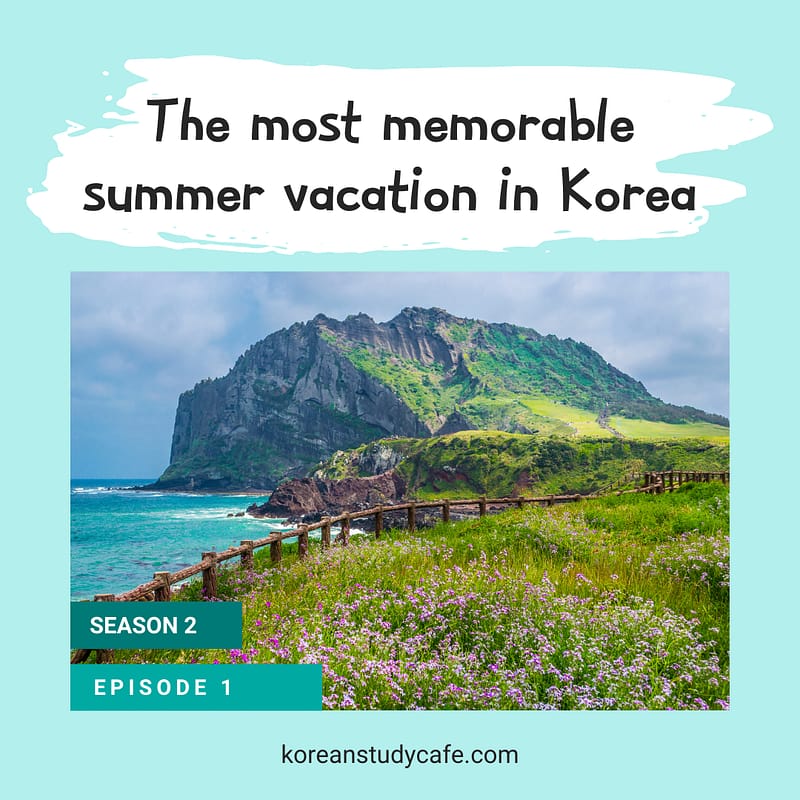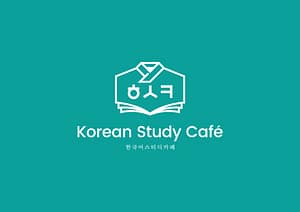Powered by RedCircle
Hello! It’s your host of Korean study café, Vanessa. 잘 지냈어요? How have you been?
Today for the first episode of season two, we will listen to a text written by Korean Study Café about the most memorable summer vacation and the recommendable vacation spot in Korea. The text uses the sentences ending with 요, the most commonly used sentence-ending pattern in everyday Korean conversation.
Hopefully, you can utilize the sentence structures you will learn in today’s lesson to help you improve your Korean speaking skills.
Then now, shall we listen to the text?
어린 시절 가족들하고 바다로 여행 갔을 때가 제일 기억에 남아요. 사실 제 고향은 부산이에요. 아시다시피, 부산은 아름다운 바다로 유명한 도시에요.
그래서 어릴 때 여름마다 가족들하고 바다에 놀러 갔어요. 바다에서 동생들이랑 작은 게도 잡고 해수욕도 했어요. 물론 나중에 다 풀어줬는데 게 잡는 것이 꽤 재밌었어요. 동생들이랑 누가 더 많이 잡는지 내기도 자주 했어요.
부산은 남해에 있어서 바다 생물이 그렇게 많지 않은데 서해로 가면 다양한 갯벌 생물들을 볼 수 있어요. 한국의 서해는 세계에서 가장 큰 갯벌을 가진 곳 중 하나예요. 그래서 갯벌 체험을 다양하게 할 수 있어요. 그 중 가장 유명한 곳은 보령이에요. 보령의 갯벌에는 피부에 좋은 머드가 많아요. 그래서 그걸로 팩도 하고 마사지도 하면서 즐거운 시간을 보낼 수 있어요.
여름에 한국의 바다로 여행가면 이렇게 재미있는 체험들을 많이 즐길 수 있어요. 그리고 당연히 맛있는 생선 요리도 먹을 수 있어요. 언젠가 코로나 바이러스가 없어지면 한국으로 여름 휴가 오세요.
Wow, the most memorable summer vacation for her was the one she spent with her family when she was young. Right? No matter how good a vacation spot might be, it is most memorable when going with people you love.
Now let’s break down some useful expressions together.
어린 시절 가족들하고 바다로 여행 갔을 때가 제일 기억에 남아요. 사실 제 고향은 부산이에요. 아시다시피, 부산은 아름다운 바다로 유명한 도시에요.
So it seems like the writer has a good memory of her hometown with her family. Right? And she said her hometown 고향 is Busan. Have some of you visited Busan before? Busan is indeed an incredible city to travel to where the beautiful sea surrounds it. So it should be an excellent place to spend summer vacation.
By the way, what we have to be aware of in this part is that even though the writer wrote 바다 sea or ocean instead of beach 해변, it’s not awkward at all in Korean.
In English, people usually say I’m going to the beach, but Koreans prefer saying I’m going to the sea(저는 바다로 가요) instead of I’m going to the beach. (저는 해변으로 가요)
We prefer to use the word 바다 to the word 해변. It’s just a matter of preference.
And now, let’s hear the next part.
그래서 어릴 때 여름마다 가족들하고 바다에 놀러 갔어요. 바다에서 동생들이랑 작은 게도 잡고 해수욕도 했어요. 물론 나중에 다 풀어줬는데 게 잡는 것이 꽤 재밌었어요. 동생들이랑 누가 더 많이 잡는지 내기도 자주 했어요.
So she said when she was young, she visited the sea/beach with her family every summer. Here she used the verb 놀러가다. This verb combined verb 놀다 to play or to have fun with 가다 to go. So it means to go somewhere for fun.
And if you want to apply this expression and say, for example, “my friend comes to my place for fun,” in better words, “my friend comes to my place to hang out” then you can say “제 친구가 우리 집에 놀러 와요” so you can combine with the verb “to come 오다” like this.
So remember 놀러가다(to go somewhere for fun) and 놀러오다 (to come somewhere for fun)
Also, we could hear the word 게. You might think this is a dog 개. But actually, it’s not. It’s a crab. Well, Do you hear the difference in the pronunciation? 게 crab and 개 dog.
Well, even as a native speaker, it is hard to hear the difference. Then you might wonder how we can distinguish between one and another. The best way to differentiate is to understand the context and the verb that the speaker uses. Since the writer is talking about a beach, we can make an educated guess that it might be a crab, not a dog. Also, she said the verb 잡다 to catch. And usually, we don’t catch a dog on a beach, so that will not be it.
And the writer used an excellent vocabulary, “해수욕” which only native speakers would use.
The word 해수욕 means sea bathing, where 해수 mean seawater and the last syllable 욕 means bathing.
A similar word is 일광욕 which means sunbathing, where 일광 means sunlight 욕 means bathing. These are the good words to make your Korean sound very natural. So remember it!
Also, 욕 has various meanings, and we will try to cover them in future lessons.
Anyhow, let’s continue to the next part again.
부산은 남해에 있어서 바다 생물이 그렇게 많지 않은데 서해로 가면 다양한 갯벌 생물들을 볼 수 있어요. 한국의 서해는 세계에서 가장 큰 갯벌을 가진 곳 중 하나예요. 그래서 갯벌 체험을 다양하게 할 수 있어요. 그 중 가장 유명한 곳은 보령이에요. 보령의 갯벌에는 피부에 좋은 머드가 많아요. 그래서 그걸로 팩도 하고 마사지도 하면서 즐거운 시간 보낼 수 있어요.
She mentioned 남해 which means south sea and 서해, which means west sea. If we look at each syllable, the 남 means south, 서 means west, and the last syllable 해 means sea or ocean. That is how남해 means south sea and 서해 means west sea. Additionally, other words indicate the direction. East means 동and North means북. So, for example, if you want to say north sea in Korean, then you can say “북해,” and if you’re going to say East sea, you can say 동해.
Back to the writing, the author explained the different features between 남해 and 서해. As she said that Busan is located in the South sea, there aren’t many marine creatures, but you can see various marine life in the wetlands if you go to the West sea.
All right, 갯벌 is mudflat/wetlands created by the difference between the rise and fall of the tide. It is the uniqueness of the West sea in Korea, where a variety of distinctive marine creatures live due to tons of mud. Also, as the author said, it is where you can enjoy diverse mudflat activities. Boryong is a famous region for mudflat activities which consists of good minerals for your skin. So you can apply a face pack and massage with this mud.
Hmmm, I visited Boryong for a mud festival once, and I had a fantastic time. Also, you can feel that your skin becomes better after a mud facial mask. There are lots of Koreans visiting during summer, but also tons of foreigners visit as well. I strongly recommend you take part in the Boryong mud festival if you are visiting Korea in the future.
All right, then now let’s hear the last part.
여름에 한국의 바다로 여행가면 이렇게 재미있는 체험들을 많이 즐길 수 있어요. 그리고 당연히 맛있는 생선 요리도 먹을 수 있어요. 언젠가 코로나 바이러스가 없어지면 한국으로 여름 휴가 오세요.
As we hear from this part, we know that the writer highly recommends the summer vacation in the mentioned regions. As a Korean who lives in a foreign country, it makes me go back so badly. Haha
She said you can enjoy entertaining activities like this if you go and visit Korean beaches in summer. And you can, of course, have delicious fish dishes/seafood.
When she describes fish dishes in Korean, she used the expression “생선 요리,” 생선 which means fish as a food ingredient and you learned 요리, which means dish in this case, but if it’s used as a verb, then it means 요리하다 to cook
Also, if you want to say fish that are alive, don’t use the word 생선, instead, say 물고기. If you oppositely use the word, people still can understand, but it sounds a little bit off.
And in the last part, she stressed out to suggest visiting Korea once COVID-19 is over. To say COVID-19 코로나 19 or Coronavirus 코로나바이러스, she said 코로나. This is an abbreviation of Coronavirus.
As you know, Korean people like it when things are done quickly or fast. So in our daily conversation, instead of saying COVID-19 or Coronavirus, we prefer to say just “코로나 Corona”.
So How was it? This is the first Korean text written by Korean Study Café for our listeners where we talked about summer vacation.
I hope you found it interesting. Since we talked about just a topic, it should be a perfect opportunity to learn associated expressions and terms.
So if you want to check out the transcript of today’s conversation, please visit koreanstudycafe.com/podcast.
Also, we upload some grammar points and expressions related to this topic on our Instagram “koreanstudycafe.official” and our Twitter “koreanstudycafe”.
Also, if you have any questions or suggestions, feel free to contact us using any social media platform or directly through our website.
그럼 오늘도 들어주셔서 감사합니다. Thank you for listening today—다음에 또 만나요. See you again soon. 안녕~~~!





